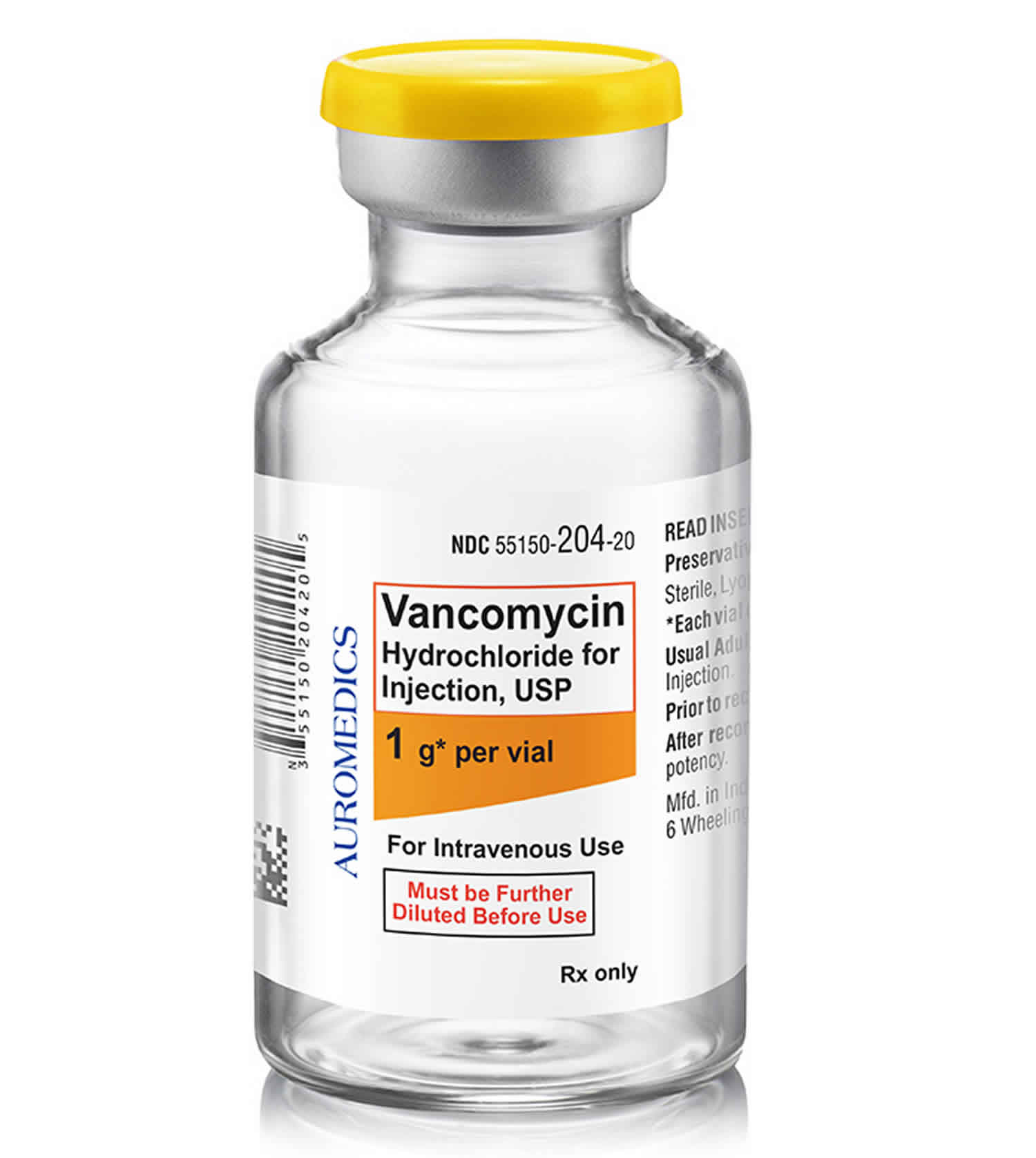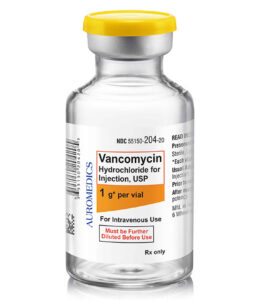
Vancomycin
Vancomycin is an antibiotic in the glycopeptide category, prescribed for certain bacterial infections. It is to treat serious skin infections, infections in the bloodstream, endocarditis, bone and joint infections by intravenous administration. its also used for treatment of meningitis caused by methicillin-resistant Staphylococcus aureus.
Drug Class
Vancomycin belongs to the Glycopeptide Antibiotic class.
Mechanism of Action
Vancomycin inhibits bacterial cell wall synthesis by binding to the D-alanyl-D-alanine residues of the cell wall precursor. It prevents the formation of bacterial cell walls. This results in bacterial cell death.
Uses of Vancomycin
Vancomycin has following uses.
Methicillin-resistant Staphylococcus aureus (MRSA) infections
- Severe skin and soft tissue infections
- Endocarditis
- Pneumonia
- Bone and joint infections
Clostridium difficile infections (C. difficile)
Vancomycin in oral form is used to treat antibiotic-associated colitis caused by C. difficile.
Bacteremia
Doctors use it to treat bloodstream infections caused by Gram-positive bacteria, including MRSA.
Osteomyelitis
Vancomycin is used to treat Bone infections, where the infection is resistant to other antibiotics.
Meningitis
It is indicated for the treatment of Infections in the central nervous system caused by Gram-positive organisms.
Endocarditis
Infections of the heart valves, particularly in patients who cannot tolerate other antibiotics are treated by Vancomycin.
Side Effects of Vancomycin
Common Side Effects
Red Man Syndrome
Rapid infusion of the vancomycin causes flushing, rash, and hypotension. This can be managed by slowing the infusion rate.
Phlebitis
Inflammation at the injection site, leading to pain or redness.
Nausea and Vomiting
Mild gastrointestinal side effects.
Fever
An occasional side effect, especially during the early stages of treatment.
Headache
Mild to moderate headaches.
Serious Side Effects
- Nephrotoxicity (Kidney Damage)
It can damage the kidney as a result of elevated serum creatinine and kidney dysfunction when combined with other nephrotoxic drugs.
- Ototoxicity (Hearing Loss)
It can cause reversible or irreversible hearing loss after taking high doses or in patients with renal dysfunction.
- Hypersensitivity Reactions
Symptoms include rashes, urticaria, or more severe reactions such as anaphylaxis.
- Thrombocytopenia (Low Platelet Count)
This can occur with prolonged therapy leading to bleeding issues.
- Stevens-Johnson Syndrome
A rare but serious skin reaction with blistering, peeling skin, and mucosal involvement.
Contraindications
- Contraindicated in patients with a known allergy or hypersensitivity to vancomycin or any of its components.
- Doctors must advise caution to patients with preexisting kidney disease.
- Caution in patients with hearing loss, as vancomycin can worsen ototoxicity.
Precautions
- Renal Function Monitoring is required.
- Monitor Hearing Function.
- Vancomycin should be infused over at least 60 minutes to prevent Red Man Syndrome.
Drug Interactions
Nephrotoxic Drugs
- Aminoglycosides (e.g., gentamicin, tobramycin) (Increase the risk of nephrotoxicity when used together)
- NSAIDs (e.g., ibuprofen, aspirin) (Can enhance the nephrotoxic effects of vancomycin)
- Loop Diuretics (e.g., furosemide) (Increases the risk of ototoxicity)
Cytotoxic Drugs
- Cisplatin, Cyclophosphamide_ Increased risk of kidney damage.
Penicillins
- Co-administration can enhance the bactericidal effect against Gram-positive bacteria.
Cholestyramine
- May reduce oral vancomycin’s effectiveness in treating C. difficile infections.
Popular Brand Names of Vancomycin
| Brand Name | Formulation | Strength | Indication |
| Vancocin | Oral, IV | 125 mg, 250 mg, 500 mg (oral); 500 mg, 1 g (IV) | MRSA, C. difficile, severe infections |
| Vancoled | IV | 500 mg, 1 g | MRSA, skin infections, bacteremia |
| Vancomycin HCl | Oral, IV | 500 mg (IV); 125 mg, 250 mg (oral) | Severe infections, C. difficile |
| Fresenius Vancomycin | IV | 500 mg, 1 g | Severe Gram-positive infections (MRSA) |
| Lyovac | IV | 500 mg, 1 g | Severe Gram-positive infections (MRSA) |
Dosage & Administration
Adult dose
- IV (for systemic infections)
- 15-20 mg/kg every 8-12 hours (adjust according to renal function).
- Oral (for C. difficile infections)
- 125 mg 4 times daily for 10-14 days.
Pediatric Dosage
- Similar to adult dosing, dosage adjustments based on weight and age may be necessary, particularly for neonates.
Conclusion
Vancomycin is an antibiotic used for treating severe infections caused by Gram-positive organisms that are resistant to other antibiotics (e.g., MRSA). However, monitor carefully because it may have some side effects.
